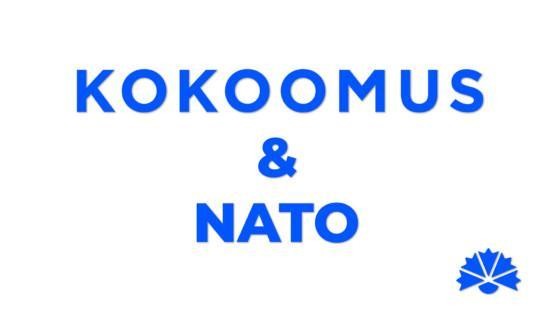
The National Coalition Party’s answers to Nato questions
Published:
What is the position of the National Coalition Party towards NATO?
- The position of the National Coalition Party is clear: we are ready to make Finland a member state of NATO. We are working actively towards this objective. Russia’s offensive highlights the current relevance of NATO membership, but for us it’s not only a question of reactions to the immediate situation, but of a long-term choice. Finland is a European state that must have a European defence solution. We’ve stood behind this position for a full 16 years.
Why should Finland join NATO?
- NATO membership would improve our security and strengthen our defence. Through membership, Finland would fall within the scope of NATO’s security guarantees and a potential attacker would have to take into account that Finland would have the support of the whole alliance’s military power and, ultimately, the shield of nuclear weapons. In addition to this, through NATO membership Finland’s possibilities to influence questions that are important in terms of global security would grow.
Why is the issue current right now?
- Finland’s security environment has changed rapidly in a worse direction through Russia’s offensive. The question is one of a more widespread war and the most serious security policy crisis in Europe since World War II. The impacts are also reflected in Finland and the Nordic countries. Finland is not being subjected to a military threat just now, but Russia has become a military threat to us as well in a more apparent way than before. Russia’s attack into Ukraine shows that Putin does not ultimately respect the military non-alignedness of states and reasons for waging war against others can be invented, even based on blatant lies. In Finland, it must now be decided how we can best ensure our security and prevent the arising of military crises. A military alliance is one of the key solutions.
Is Finland welcome to become a member of NATO?
- From NATO’s perspective, Finland would be a desirable member state that creates security, rather than eating away at it. Finland’s involvement would stabilise Northern Europe, because from NATO’s point of view we are a missing defence link in the area between the Arctic region and the Baltic Sea. In addition to our location, our capacities would complement NATO, particularly through the strength of our land and air forces. NATO has emphasised an open-door policy towards Finland and Sweden with regard to membership.
What will happen to the NATO option?
- Talking about the NATO option is no longer credible. Utilising the option has previously been linked to a rapid change in our security environment or Russia seeing the EU as an enemy like NATO. Now both of these have come true, in addition to which Russia has defined Finland, along with the whole of the EU, as a hostile country from its point of view. Arms deliveries by the West are also interpreted as hostile actions in Russia. So we are more and more apparently a part of the enemy picture seen by Russia, and in this kind of development Finland should anchor itself more strongly as a part of western defence solutions. For that reason, it’s time to utilise the option.
Is Finland in a hurry?
- We are ready to make Finland a member state of NATO and will push for membership in Parliament. Understandably, the situation, which has changed quickly, has put many parties before a new set of circumstances. Time and room must be allowed for consideration, but at the same time it must be understood that we also can’t wait too long in the prevailing situation. History shows how important it is to know how to seize situations that open up in a purposeful manner.
- Our security environment has changed permanently, but now it’s time for conclusions. The key question for us is the securing and defending of Finland’s security policy position. Russia has become a military threat to us as well in a more apparent way than before. In Finland, it must now be decided how we can best ensure our security and prevent the arising of military crises. A military alliance is one of the big questions.
What options does Finland have?
- Very solid justifications should be found for staying outside NATO so that it would be the right solution from our point of view. Being non-aligned does not automatically mean better security. Returning to the option policy is no longer possible. In practice, Finland is facing a ‘now or never’ choice with regard to membership. If Finland rejected NATO membership even after the attack by Russia, this would send the wrong message to Moscow. Our passivity could, in the worst case, be interpreted as timorousness. We don’t want to give this kind of outward impression of ourselves and we can’t now afford to leave any kinds of gaps or room for interpretation in Finland’s security policy position. So if Finland does not apply for NATO membership, clear rationales should be presented for the decision, as well as a vision of an alternative policy that would ensure our security in the future.
How will the decision on applying for membership be made in Finland?
- The question regarding Finland’s NATO membership will come before Parliament in the next few weeks when the Government produces a report about the security situation. Parties have now largely recognised the facts – the security environment has changed. The next step is active action. The change requires robust decisions. The National Coalition Party wants that these decisions are also made. We can’t be left in limbo. In the opinion of the National Coalition Party, the report and parliamentary process should lead to a proposal regarding membership from the Government and the President of the republic. Parliament will make the final decision on submitting a membership application.
How would the membership process proceed?
- NATO makes its decision unanimously. In that case, Finland must have discussions with all the member states beforehand and secure their support. NATO has emphasised an open-door policy towards Finland and Sweden.
- If Finland applied for NATO membership, member negotiations would take place next, where the parties could present terms and member suitability would be gone through. In Finland’s case, its stable democracy and military compatibility mean that it meets the formal criteria.
- Generally, the application process takes from a few months to a year. Due to Finland’s NATO compatibility, and taking the security situation into account, the process would probably be shorter than normal. Some kind of fast track might come into play, but a lot would depend on the member states. Finland’s application would have to be ratified in all the parliaments of NATO’s member states.
- If all of NATO’s member states approved Finland’s application, Finland would be sent an invitation to join NATO. The instrument of ratification would be presented through a proposal by the Government for the approval of the Parliament, after which its ratification would be decided on by the President of the republic.
Should Finland apply for membership together with Sweden?
- It would be worth making the NATO application together with Sweden. In that case, Finland would have to coordinate the steps in advance with them. The simultaneity would bundle the security of the countries together for the period of the process in a way that Finland would also benefit from. However, Finland needs to make the decision from its own starting points and also be prepared to apply for membership alone.
Should a referendum on NATO be held in Finland?
- NATO requires an applicant country to demonstrate a sufficient level of national support for membership. However, it’s up to the applicant country to decide how this is measured and NATO does not require a referendum from an applicant country. The right place to measure the support of the majority of Finns for NATO membership is the Parliament elected by the people. Many opinion polls after Russia’s attack also indicate that a majority of the population has turned in favour of NATO membership.
What kind of military support would NATO give Finland?
- The greatest added value provided by NATO would be the support of the alliance in a crisis situation. NATO’s Article 5, i.e. the collective defence commitment, means that an attack on one member state is to be seen as an attack on the whole of NATO. This serves as a deterrent to aggressive states. Finland would enter the sphere of NATO’s regional defence plans, in accordance with which other member states would get prepared to support Finland. These plans would also be maintained and practised regularly.
- The military support given to Finland would depend on the crisis situation, but could, for example, be intelligence and situational picture information, material and secured logistics support, military support in the form of troops for different branches of the defence forces, missile defence support and the nuclear weapon deterrent.
What would membership mean for Finland’s security policy?
- The biggest change would be entering the sphere of NATO’s security guarantees. In practice, changes would be mostly technical, but also to do with security policy in a wider sense. Above all, for Finland membership would be about the harmonising of defence together with NATO, as a part of protecting Northern Europe. In addition to that, there would be a global grasp on Finland’s security policy that would be stronger and more binding than now, particularly in the long term.
- The issue being that the security questions of NATO’s southern member states would also come more strongly to the fore in a geographical sense, and especially with a longer view, also possibly questions related to China. So, the profile of Finland’s security policy would inevitably become diversified within NATO. In other words, NATO membership would call for Finland’s preparednesses to be developed, also outside the borders of our country. Finland has, however, already participated in many NATO-led operations outside its borders, for example in Kosovo, Bosnia and Afghanistan. In addition, we have decades of experience of international crisis management.
What effects will membership have on Finland’s national defence?
- Finland would still decide itself on the principles according to which military national defence is realised. Even as a NATO member, Finnish professional soldiers and reservists would still be responsible for the defence of Finland, so universal military service would retain its principal role.
- The border and airspace of Finland would become a part of NATO’s corresponding ones. Despite this, the monitoring and ensuring of the territorial inviolability of Finland would still be the responsibility of the defence forces. Finland would allow NATO to use the air and sea situational pictures produced by its national systems, and vice versa.
Will conscripts be sent abroad?
- Conscripts and reservists would not be sent to NATO’s operations outside the borders of Finland, but instead professional soldiers or volunteer reservists would be used for this, as has been done up to now in crisis management operations. In principle, Finland’s resources would be at its own disposal.
What kind of member model would Finland have?
- It’s in Finland’s interests to fully participate in discussion about the membership model and defence planning without preconditions. It’s justified that Finland does not have to, for example, permit nuclear weapons on its territory. Instead, we should not categorically refuse when it comes to NATO troops or bases, but keep the possibilities open.
How would Finnish troops participate in NATO’s operations?
- Finnish troops would always participate in NATO’s operations according to need, not automatically. One possibility might be participating in NATO’s EFP activity in the Baltic states with a small investment. Finland would take part in crisis management outside the NATO area as before.
What would be the costs and effects of membership on the expenditure of the state?
- According to estimates, the NATO costs would be approximately 50 million euros per year. This would consist of payments to NATO’s mutual annual budgets and personnel expenses. Additional expenses could come from NATO’s multinational performance projects that Finland could take part in.
- The NATO countries have an objective to keep defence spending at a level of two percent of GDP. Finland meets this requirement through the HX project, but naturally membership would also require this defence spending level to be kept up in the long term.
What effects would membership have on Finland’s foreign policy and right to self-determination?
- Finland’s right to self-determination would remain as strong as it is now. NATO is a political alliance where decisions are made in accordance with a principle of unanimity. In this case, Finland would probably work in close cooperation particularly with the Nordic countries and Baltic states, just as in the EU. Finland’s emphasis would strongly be on defending neighbouring areas and in that, in operations as per Article 5.
- Our Russia policy would merge more closely with that of the rest of the West. However, NATO’s policies towards Russia are in practice identical to those of the EU, so in this sense, even in NATO, Finland’s Russia policy would not really change.



